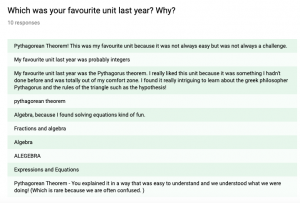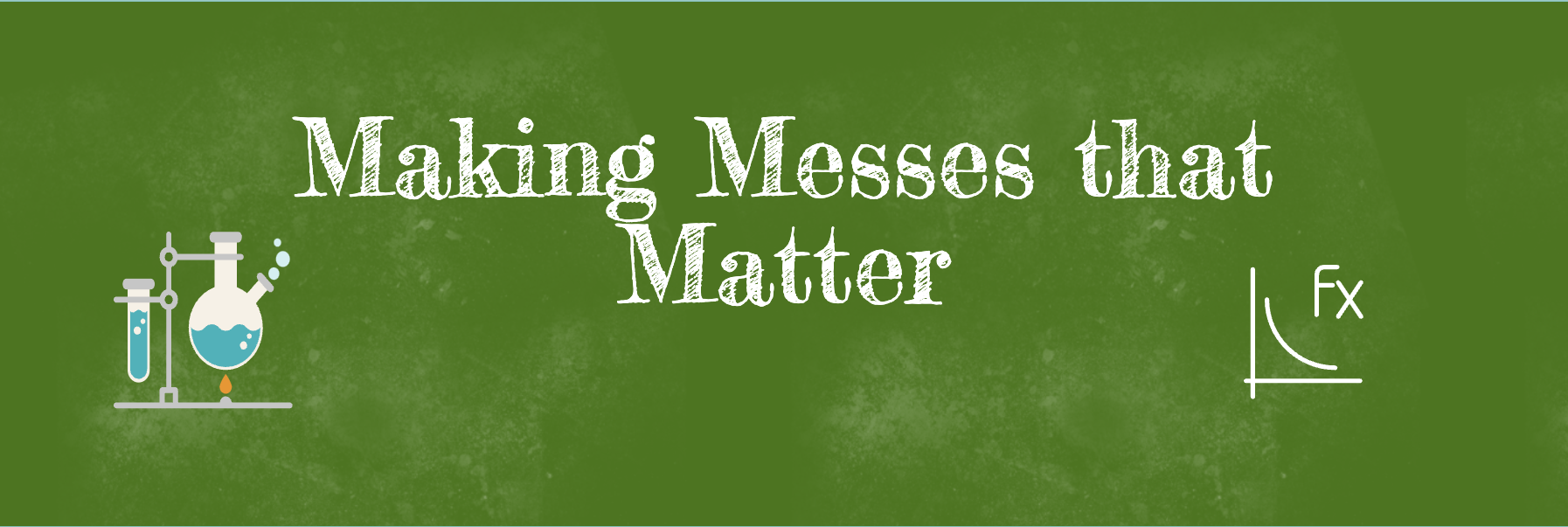After coming through from our first face to face and discussing my goals with my mentors, I came out with a much clearer picture of what I wanted to work on this year. After sitting down with Tina @mstinajagdeo, Lisa @lmitchell and Marc @marcbrims and discussing my thoughts I realized that my biggest area that I wanted to work on was expanding my math abilities. In science I feel confident in my use of PBL and my ‘toolbox’ of different strategies and options that my students have. Through it I felt I was able to create a strong level of differentiation and personalization but this was something I felt I was lacking in math and wanted to expand on. it’s also something our school has decided to put much more focus on this year. I was unsure about my lessons as a lot of them involved Power Points and notes and not as much hands on activities as my science lessons. That being said I needed to be sure this was what fit with what my students might need and how they learnt best. To find this out I designed a survey that I would send out to my students from last year, as they had already been through a year with me and had more material to go off of than my current students. I have to give credit to Tina here as this was her brilliant idea! So I went on to developing my survey.
The hardest part of the next stage was making sure my ego was not coming into play. When asking my students I had to make sure my questions didn’t go the direction I wanted it to go, but instead were neutral questions that promoted reflection on how they learnt. Looking back I can think of my favourite math unit and why I think my students might have thought the same way, but just because I enjoyed it and felt it went deeper doesn’t mean all of my students might have. The whole point was to learn from my students and not just puff up my ego as a teacher and pat myself on the back.
To that end I made a list of students to send my survey to and made sure they were from a wide variety. On my list were my high flyers and math lovers as well as students that struggled and perceived themselves as bad at math when they first entered my classroom. I also included students who were new last year as well as students who had been at my school since pre-K. I wanted to make sure all of my bases were covered and I could get the most variety and opinion.
The overall goal was to determine what style of lessons my students preferred and what they felt they needed more of to succeed in class. I also wanted to know if there were other strategies they might need that I wasn’t suppling. I work very hard on metacognition with my students as they are at an age where it really starts to be something they can do. So asking them to constantly reflect is a process I spend a lot of time on and I felt I could use for my research. I had them reflect on strategies they felt helped them learn as well as other ways they might like to be assessed.
 The results were not what I expected (which I’m sure my mentors expected). The area I thought my students would gravitate to more was a unit my teaching partner and I developed last year about Pythagoras. In that unit the students discovered the formula on their own through a series of tasks they were given. Instead of simply being given the formula they found and made it themselves. I loved this unit, it was hands on and because the students discovered it themselves I found they remembered and understood it much more than they would have otherwise. What I found was that my lower ability and gifted students mentioned this unit as being their favourite in the year for those very reasons.
The results were not what I expected (which I’m sure my mentors expected). The area I thought my students would gravitate to more was a unit my teaching partner and I developed last year about Pythagoras. In that unit the students discovered the formula on their own through a series of tasks they were given. Instead of simply being given the formula they found and made it themselves. I loved this unit, it was hands on and because the students discovered it themselves I found they remembered and understood it much more than they would have otherwise. What I found was that my lower ability and gifted students mentioned this unit as being their favourite in the year for those very reasons.
My high flyers however mentioned Algebra as being their favourite. The reasons they gave were answers like this
“I think my favourite lessons were the ones that had real world problems and ones that let us use our creativity.”
“These methods worked best for me because they made my busy schedule more flexible and homework became a lot less stressful!”“I chose the choices because it was easier for me as an individual to work this way. Other people probably have a different because each student learns the best in their own ways.”“I think watching Miss Garand walk us through the steps really helped as I could correct my mistakes thoroughly and see where I made the mistakes. I think this is different from the other strategies because we are actually getting the right answer and strategies to solve it next time.”“Having the teacher explain any concepts that might seem difficult and going through questions that I get wrong so i understand where my mistake was”“For me it helped a lot to go through the homework and be able to ask questions. I got to practise, which really helped, but I still learned what I hadn’t yet figured out.”
“I like having somebody explain it to me (a person, not a video) so that I can ask questions. I also found it beneficial to learn with the class so that if I don’t understand the way the teacher is explaining, a classmate could jump in and explain it in a different way.””
“Trial and error – you can discuss with peers why something may or may not work! Working with people is fun”
“I liked using the triangle with three squares on the outside of it in the first pythag lesson to understand the theorem if that makes sense? Kinda like visual learning? also discussing concepts as a class made it seem more open of a discussion”
After looking at these answers I feel there is a lot for me to unpack and reflect on, but my biggest takeaway is how different all my students are, and I wonder if I am presenting enough different ways for them to learn outside of the safe ‘watching the teacher’ strategy. It seems that my class has a good culture in terms of discussion and presenting ideas but I would like to create more opportunity for them to take more risk and solve more real world problems.

Allowing them to use their creativity more I think would create an even more fun and engaging classroom. To that end I’m excited to expand my toolbox and try and find more strategies that fit with my students needs. I’m also interested in hearing thoughts from the Cedar group and my mentor’s on my student’s thoughts and my reflections. Looking forward to asking the room!




